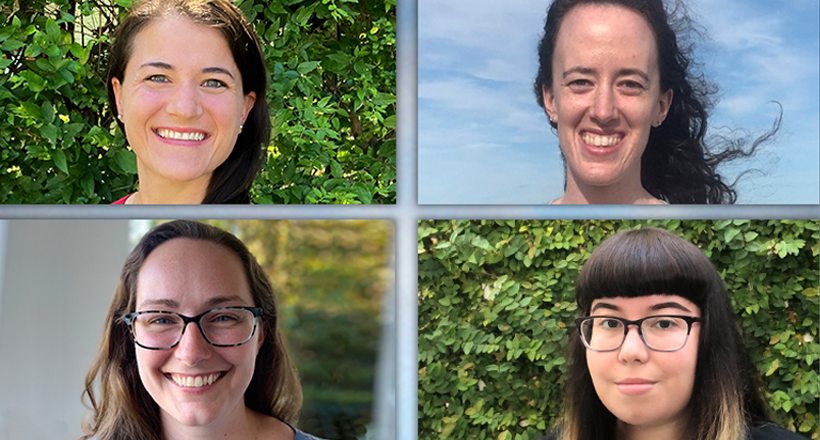EDUCATION
Four From Rutgers Named 2022 NOAA Sea Grant Knauss Marine Policy Fellows
CARISSA SESTITO / RUTGERS TODAY – Four Rutgers graduate students – the most of any institution of higher education in the United States – are among 74 finalists selected for the 2022 class of the National Oceanic and Atmospheric Administration (NOAA) Sea Grant John A. Knauss Marine Policy Fellowship Program.
Named after oceanographer and meteorologist John A. Knauss, one of the founders of the Sea Grant and former NOAA administrator, the one-year paid fellowship has provided almost 1,500 students interested in how national policy decisions affect ocean, coastal and Great Lakes resources the opportunity to work with either the legislative or executive branch of the government since the program was launched in 1979.
The four Rutgers graduate students who will become part of the 43rd class of the fellowship are:
Janine Barr is a second-year master’s student in the Department of Marine and Coastal Sciences at the School of Environmental and Biological Sciences (SEBS) pursuing a degree in oceanography under adviser Daphne Munroe. Barr worked as a research fellow in the United States Environmental Protection Agency (EPA) following her graduation from Gettysburg College in 2015 with bachelor’s degrees in biology and environmental studies. At the EPA, she conducted policy work and supported the Standards and Health Protection Division’s implementation of water quality standards to protect fresh and marine water quality consistent with state and federal regulations. At Rutgers, Barr is a Coastal Climate Risk and Resilience (C2R2) fellow and studies the coastal ecology of oyster farms. Through this work, she is quantifying the water quality benefits this form of aquaculture may provide and how climate change may impact this ecosystem service.
“I’m looking forward to expanding my understanding of how leaders at the federal level balance conservation and management of our nation’s marine resources in their daily work, as well as how stakeholders are meaningfully engaged in this decision-making process.”
Schuyler Nardelli is a Ph.D. candidate in oceanography with a bachelor’s degree in earth and oceanographic science and environmental studies. Nardelli’s background is in bio-optics and phytoplankton. After finishing her undergraduate studies, she spent a year as a research assistant in an ocean optics lab at the Harbor Branch Oceanographic Institution in Fort Pierce, Florida. Nardelli uses optics as tools for learning about both phytoplankton and physiology and ecology within the physical constraints of coastal ecosystems. She expands this knowledge by studying plankton ecological dynamics in response to climate change off the coast of the Western Antarctic Peninsula using both optical and acoustic techniques.
Through the fellowship, Nardelli hopes to step outside her comfort zone.
“I am looking forward to learning how scientific research is used to create policy, working with diverse stakeholders, and stepping outside my comfort zone,” she said.
Ashlyn Spector is a second-year master’s student in the Earth and Planetary Sciences Department at SEBS with a bachelor’s in geology from the University of Florida. She is a C2R2 fellow and a member of the Climate Resilience Corp of the New Jersey Climate Change Resource Center housed at Rutgers. Spector’s research involves reconstructing sea level, sea surface temperatures and ice volume from the Miocene Climate Optium. Her research interests also include using drone technology for geoscience education purposes, as well as integrating science with policy action to better prepare communities for the increasing risks of climate change.
“I’m looking forward to participating in policy making at a national level by helping to draft legislation and improving my science communication skills,” she said of the fellowship.
Liza Wright-Fairbanks is a Ph.D. candidate in the Department of Marine and Coastal Sciences (DMCS) at SEBS where she is a member of the Center for Ocean Observing Leadership. Her dissertation research focuses on the use of underwater gliders to investigate drivers of coastal ocean chemistry in the Mid-Atlantic. Wright-Fairbanks is a leader in diversity, equity, and inclusion efforts at DMCS, serving as a founding student member of the DMCS DEI committee. In her free time, she enjoys gardening and hiking with her dog.
“I look forward to improving my communication skills in an interdisciplinary setting and learning how scientific research can influence federal policy,” Wright-Fairbanks said.
Knauss finalists are chosen through a competitive process that includes comprehensive review at both the state Sea Grant program and national levels. Students that are enrolled in or have recently completed their master’s, juris doctor (J.D.) and doctor of philosophy (Ph.D.) programs with a focus or interest in marine and coastal science, policy or management apply to one of the 34 Sea Grant programs.


